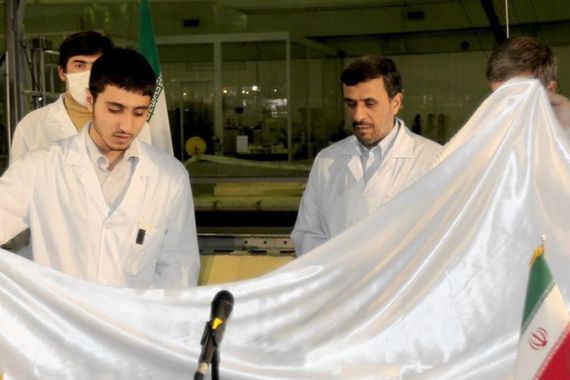UN watchdog cites Iran nuclear concerns
IAEA head says there are indications of unspecified “activities” at military site which inspectors want to visit.

Iran has tripled its monthly production of higher-grade enriched uranium and the UN nuclear watchdog has “serious concerns” about possible military dimensions to the country’s atomic activities, the agency’s chief says.
Yukiya Amano, head of the International Atomic Energy Agency (IAEA), said on Monday there were indications of unspecified “activities” at an Iranian military site which his inspectors want to visit as part of an investigation into fears Iran may be seeking nuclear weapons capability.
“We have some indication that activities are ongoing at the Parchin site. It makes us believe that going there sooner is better than later,” Amano said, giving no further details.
His remarks confirmed comments made by IAEA diplomats to Reuters news agency last week when one said: “We have heard about possible sanitation” of the Parchin site that he called “very concerning,” suggesting Iran may be delaying access while it removed evidence of suspect activities.
Parchin is a weapons development site owned by Iran’s Defence Industries Organisation, a group of state-owned military companies.
The IAEA was granted access to parts of the facility in November 2005, and a subsequent report documented no “unusual activities” nor the presence of nuclear material.
Iran maintains that it is not seeking to develop nuclear weapons, despite Western suspicions to the contrary.
Government support
Sadegh Zibakalam, a professor of political science at Tehran University, says there is “nothing” to suggest that the county was seeking to acquire nuclear weapons.
However, he says, some Iranians may have voted in last week’s parliamentary elections as a show of support for their government in the face of mounting international pressure.
“There are some observers who stated that one of the reasons why some Iranians voted last week was in order to say to the US and Israeli governments that, as Iranians, they are backing their own government,” Zibakalam told Al Jazeera.
Referring to threat of a possible attack on Iran, he said: “What is a military strike going to achieve?”
The US and its Western allies are seeking Russian and Chinese backing to rebuke Iran at the week-long IAEA board meeting, that began on Monday, over its failure to address the agency’s growing concerns.
Binyamin Netanyahu, the Israeli prime minister, reiterated his country’s concerns about Iran’s nuclear ambitions in a speech to the American Israel Public Affairs Committee (AIPAC), the powerful pro-Israel lobbying group, and in talks with US President Barack Obama in Washington.
“We leave all options on the table and containment is not an option. The Jewish state will not allow those who seek Israel’s destruction the means to achieve that goal. A nuclear-armed Iran must be stopped.”
In an earlier address to AIPAC, Obama called on Israel to allow time for diplomatic efforts and sanctions to work and cautioned against “loose talk of war”.
Iran’s refusal to curb sensitive atomic work that can have both civilian and military applications has drawn increasingly tough UN and Western sanctions against the major oil producer.